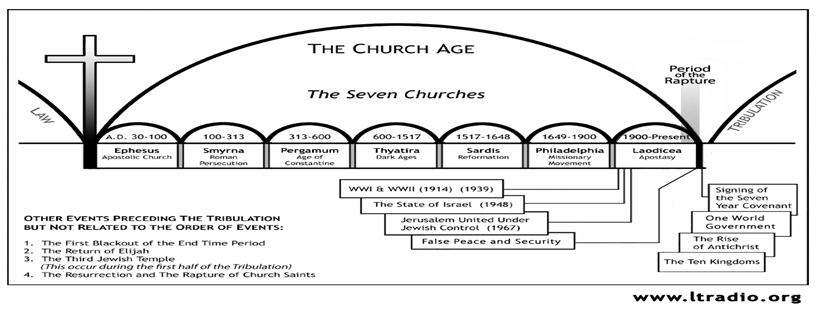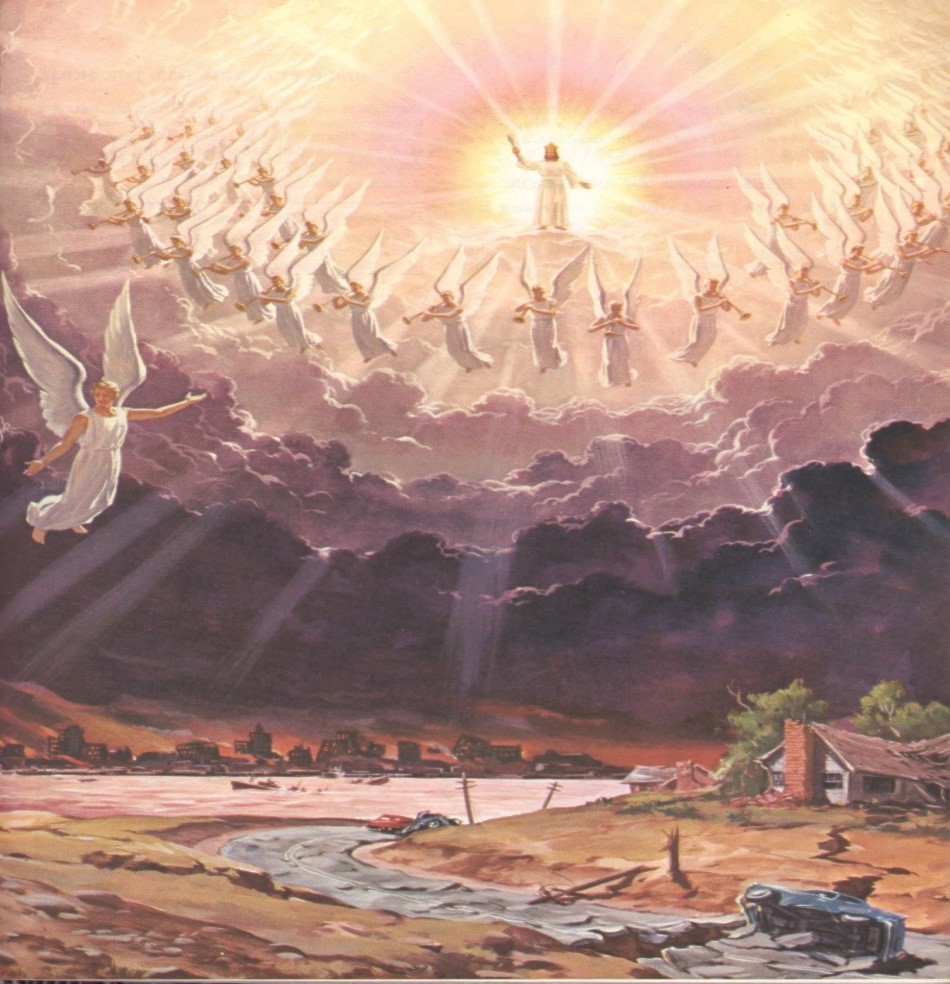Old Testament Reading – Isaiah 26:17-21 – New Testament Reading – 1 John 2:15-28
God’s Unfolding Drama of Redemption
“The Rapture of the Church” # 2
Leviticus 23:1-44, Revelation 3:7-13
Many Christians do not believe in Jesus’ physical return to this earth, much less in the sudden disappearance of all believers, including every child under the age of accountability.
- The Apostle Peter warned us of those who would mock any teaching that would change the normal patterns of life that have existed for thousands of years.
- Peter said these unbelievers either forget that God destroyed the earth with a flood or they don’t believe it happened.
Some Christians do not believe in the rapture of the Church, the seven years of Tribulation, or the return of Jesus Christ to the earth.
- They believe all of the prophetic events have already happened.
- They believe we now live in the new kingdom, and this is how it will be, world without end.
Other Christians believe the prophetic events are yet to happen, but not in the order or sequence most Christians believe they will.
- Thankfully, one’s view of eschatology is not essential to their eternal salvation.
According to my understanding of the Scriptures, the rapture of the Church can happen at any moment – it is always imminent.
- Sadly, most of today’s Christians haven’t heard about the rapture, much less urged to be ready for it.
- However, as the world is becoming more and more troublesome, even many Christians want to know what the future holds.
- God is using the current crises to remind Christians of what the Apostle Paul said in Colossians 3:1-2, “If you were raised with Christ, seek those things which are above, where Christ is. Set your mind on things above, not on the things of the earth.”
- We are living in the age of deception and entering the age of strong delusion, where many will believe the truth to be a lie and a lie to be the truth.
- Every believer needs to be like the Bereans, who not only received Paul’s sermons with eagerness, but they also “examined the Scriptures every day to see if what Paul said was true.”
The Apostle Paul revealed the mystery of the pre-tribulation rapture to the Christians at Thessalonica because they were concerned about their loved ones who had died before the return of Christ for His followers.
- Paul said those Christians who died would be raised from their graves first and joined with those Christians who are alive at that time, and they would rise together to meet the Lord in the air.
- Paul based his assurance on Jesus’ promise to His disciples in John 14:1-3 that He was going back to His Father’s house to prepare a place for them, but that He would return and receive them unto Himself.
- Paul also based his assurance on his understanding of the customs of a Jewish wedding, that the Church would one day be united with Christ, as a bride is united with her husband.
- According to that pattern, Jesus returned to the Father’s house 2000 years ago to prepare a place for His Bride, the Church.
- When the Father tells Him to “go get Your Bride,” Jesus will descend from heaven and shout, “Come Forth,” and every born-again believer will rise to meet Him in the air.
- He will take us to the Father’s house, where we will dwell with Him for seven years, and after the Marriage Supper, we will return to this earth with Him, to reign with Him for 1,000 years, and in the new heaven and the new earth forever, world without end.
The Scriptures offer two more parallels to God’s timetable for our redemption.
1. The Seven Feasts of Israel – Leviticus 23:1-2, “The Lord spoke to Moses, saying, ‘speak to the children of Israel and say to them: The feasts of the Lord, which you shall proclaim to be holy convocations, these are My feasts.”
The Seven Feasts of Israel are prophetic pictures of God’s plan of redemption. Each feast is a prophetic picture of the Person and work of Christ for our salvation. Jesus has already filled the first four feasts, and He will fulfill the final three feasts very soon.
God reminded the Jews about the redemptive nature of the Sabbath Day, that it was a holy convocation, a day of solemn rest, and then He instituted the seven annual feasts.
- Passover – God told the Israelites to splash the blood of an innocent lamb upon their doorposts so the angel of death would “passover” the first-born of those who were under the blood.
- The prophetic picture of Passover was fulfilled by Jesus Christ when He shed His blood to redeem us from our sins.
- Unleavened Bread – For seven days following the Passover, the Israelites were forbidden to eat leavened bread, but instead, they were to eat bitter herbs as a picture of their grief over death.
- The prophetic picture of the Unleavened Bread was fulfilled during the time of Jesus’ burial in the grave.
- First fruits – the Israelites brought the first sheaves of grain to the priests as an offering, acknowledging God’s blessings.
- The first fruits of God’s kingdom were Christ Himself, as He was the first to rise from the dead. Christ’s resurrection filled the feast of first fruits.
- Pentecost – the Israelites celebrated this feast 50-days after the feast of first fruits with loaves of leavened bread. The priest took two loaves and waved them together, so they appeared to become one loaf.
- The feast of Pentecost was fulfilled 50-days after the resurrection of Christ when the Holy Spirit came upon the disciples, and both Jew and Gentile were saved by their faith in the same gospel.
- Pentecost fell on a Sunday, which means the Church was birthed on a Sunday, and from that day forward, Christians gathered for worship on Sunday: “The Lord’s Day!”
This is where we are on God’s prophetic timetable, as the gospel continues to be proclaimed and the Holy Spirit continues to be poured out upon those who express their faith in Jesus Christ as their Savior and Lord. The next feast is:
- Feast of Trumpets – on this day, the shofars blasted throughout the land, proclaiming a time of rest for God’s people. The rabbis gave it the name “Rosh Hashanah, which means “The head of the year.” The first day of the seventh month is the Jewish New Year.
- Many Bible scholars believe the rapture of the Church will occur during Rosh Hashanah, but they do not know in which year it will occur. This year Rosh Ha’ Shannah begins September 6th and ends at sundown on September 8th.
- Yom Kippur – the most solemn of all feasts – a time in which forgiveness is sought and given by one Jew to another and a time when expressions of repentance are made by one Jew to another.
- Bible scholars believe this feast pictures the time at the end of the Great Tribulation when the Jewish remnant will be reconciled to God as they recognize Jesus as the One whom their forefathers pierced. Hosea 5:15-6:2
- The Feast of Tabernacles – a time when the Israelites remember how their forefathers dwelled in tents before they reached the Promised Land.
- Bible scholars believe this feast pictures the time when all believers will receive their immortal bodies and be able to dwell with God forever. Revelation 31:3ff
Just as Christ has already fulfilled the first four feasts, He will soon fulfill the final three, beginning with the Feasts of Trumpets.
2. The Seven Churches of Asia – Revelation 1:4-8 “John, to the seven churches which are in Asia.”
In writing to the seven literal churches in that day, Jesus was also describing the seven different types of churches that would exist in every age and the seven stages of the Church in the total Church Age.
- The Church at Ephesus – Revelation 2:4
- The Church at Ephesus had fallen out of love with Jesus.
- They were doctrinally correct, but the love of God and the love of the brethren was gone.
- Church historians believe this “type” of church existed during the first century as their love for the Lord began to be replaced by legalism and doctrinal dogmatism.
- The Church at Smyrna – Revelation 2:10
- Persecution always purifies the church of selfishness and self-centeredness.
- Historians believe God allowed this church to be persecuted to show what is required to bring every church to repentance and to renew their first love. This severe persecution lasted for over 300 years.
- The Church at Pergamum – Revelation 2:13
- The church that blends with the world must continue to compromise its convictions to achieve its goal of self-preservation.
- This type of church lasted for another 300 years.
- The Church at Thyatira – Revelation 2:20
- Whenever false doctrine enters a church, gross immorality is not far behind.
- False doctrine leads to liberal theology, which leads to a false gospel, which leads to all kinds of sins.
- Liberal theology characterized the Church for 900 years.
- The Church at Sardis – Revelation 3:1
- A Sardis-type church was busy but barren.
- The machinery of ministry and the formality of worship continued, but there was no life in it because the church was spiritually dead.
- According to church historians, this characterized the Church from 1517 to 1648.
- The Church at Philadelphia – Revelation 3:8
- This was a church with a global view of evangelism and world missions.
- This was a church where Christ was glorified, and His name was magnified to their neighbors and to the nations.
- Historians consider this to be the last believing Church and the remnant of believers today continue to be a part of that Church.
- The Church at Laodicea – Revelation 3:14-21
- Laodicean means “man-ruled” – it is the church designed by man for the benefit of man.
- Jesus is “outside” of this church, yet He is open to anyone who will hear His voice and return to Him.
- After the rapture of the Philadelphia believers, Jesus will vomit the church of Laodicea into the Tribulation, where it will thrive for a while and then be damned to hell forever.








